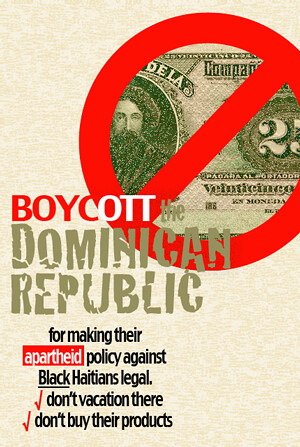| ANSWER emergency response demonstration to March 1, 2004 Coup-knapping in Haiti – March 2, 2004 |
| Lovinsky-Pierre Antoine: disappeared July 28, 2007 |
Haiti is a country that has lost thousands of its citizens--they were/are either dead or disappeared as a result of the chaos attending the upheavals of the coups. A conservative estimate of the toll was published in the Lancet in 2006 that documented 8,000 deaths and 35,000 rapes in Haiti since the second coup in 2004.
Haiti is a part of a small island in the Caribbean. It is bordered on it's right by the Dominican Republic. The Dominican Republic is where so-called "rebels" (Bush's then Secretary of State, Colin Powell characterized them as "thugs and criminals") were trained and armed by their benefactor (the US) in preparation to the second attack on Haiti's first democracy. Members of these "rebels" had also been trained and financed by US Special Forces and the CIA, including wanted drug trafficker Guy Philippe and his associates, wanted murderers/assassins Emmanuel Constant and Jodel Chamblain.
The United States of America--which is the world's number one super power--or has very good marketing apparatus that promotes the number one billing, is not and never was interested in promoting democracy in Haiti.
US government and multinational corporations/ political "interests" in Haiti
The US government's foreign policy is aligned with the Haitian sweatshops and businesses that pay poverty/slave wages to Haitian workers. A typical Haitian worker averages about $3 a day. These unethical multinationals and their Haitian coconspirators see to it that the Haitian worker is exploited and deprived of every basic human right that is enshrined in the UN "Universal Declaration of Human Rights." The UN's stated objectives in the declaration make imperative the right for workers to earn a living wage. This requires that basic employment laws that protect workers from exploitation are in place. One basic right denied to Haitian workers is the right to form unions.
What of this current UN mission in Haiti with the unfortunate and evocative acronym of MINUSTAH: United Nations Stabilization Mission in Haiti? The UN has now been occupying Haiti for the past five years under the pretext of bringing stability, after the violent kidnapping of the democratically elected government (which it supported), yet human rights for poor Haitians have not been a part of their mission. Perhaps this is because the security/stabilization they seek is for the multinational corporations and the Haitian rich business class to operate without oversight and to spare them the embarrassment of being called to account by an empowered native Haitian government?
There are many more reasons for forming a political, strategical partnership with a country that has a standing army. Below is a list of the potential candidates. Readers are invited to list their own candidates and explore the pros and cons of a partnership between Haiti and a foreign political partner. The best candidate should have a standing army and be able to withstand any economic, military or diplomatic embargo initiated and supported by the UN Security Council. As of October 15, 2009, the five "permanent" (voting) members of the UN Security Council were: United States, France, China, UK and Russia. As of today October 16, 2009--five new "non-permanent" (voting) members were elected: Bosnia and Herzegovina, Brazil, Gabon, Lebanon and Nigeria. They join Uganda, Turkey, Mexico and Japan to make up the fifteen members voting members. According to the UN, "Under the Charter, all Members of the United Nations agree to accept and carry out the decisions of the Security Council. While other organs of the United Nations make recommendations to Governments, the Council alone has the power to take decisions which Member States are obligated under the Charter to carry out."
During his UN speech in October, Libya's Muammar Gaddafi lamented the inequality among member states and criticized the Security Council as being ineffective because since its inception, 65 wars had been launched. Gaddafi also dropped the T-Bomb, calling the UN Security Council a "Council Of Terror." Unfortunately, the mainstream media in the US portrayed Gaddafi's speech as rambling and incoherent and the Guardian UK said it was mind-numbingly long. It would have perhaps been more constructive if they had focused on the substance of his first ever UN speech, instead of its length and entertainment value.
The Potential Candidates for a Partnership: Pros and Cons
Which candidate country would make the best political partner for Haiti? The Aristide government dissolved the Haitian army in 1995. President Aristide considered the Haitian military to be a primary source of oppression and an instrument used to make coups in Haiti. So, the political partner must have a standing army that fills that gap for Haiti. This is just one consideration, but a paramount one in a political partner. It would be constructive for a Haitian government which seeks autonomy to weigh the pros and cons in making a decision as to whom to approach about this matter. Conversely, any potential partner would have to be assured that the pros outweighed the cons in any partnership undertaken with the Haitian people.
Top candidates
| Country | Military Defense Apparatus |
| Taiwan | National Defense |
| North Korea | Military |
| Iran | Foreign relations and military |
| Venezuela | Military |
| South Africa | Defense |
| China | Military and Army |
| Cuba | Military |
|
Update: 11.27.09
Reported by Ansel for Free Speech Radio News (FSRN)
Read his blog post for more info.
Tensions high in Haiti after UN troops fire gunshots amidst crowd
UN peacekeeping troops in Haiti are facing accusations of using reckless force again after they fired gunshots to ward off a curious crowd earlier this month. The incident started when two UN helicopters were forced to land in the middle of a field after one of them had mechanical trouble. FSRN'S Ansel Herz reports from Port-Au-Prince.






